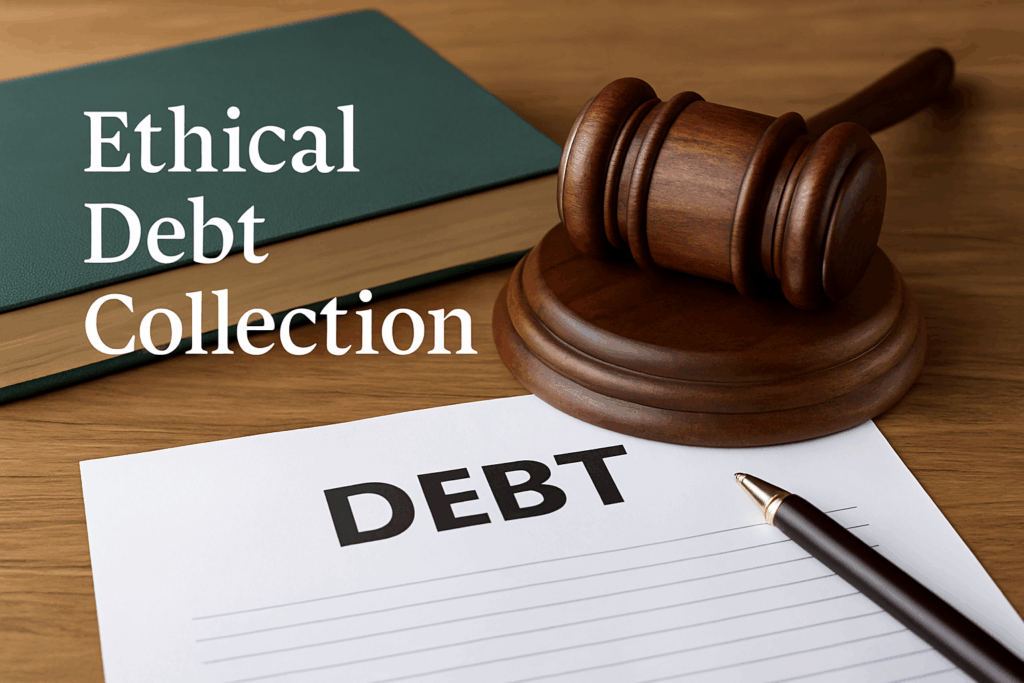Ethical Debt Collection: What Consumers Need to Know
Debt collection is an unavoidable reality for millions of consumers. However, navigating the landscape of debt collection can be confusing, stressful, and sometimes intimidating. Understanding what constitutes ethical debt collection practices empowers consumers to protect their rights and engage confidently and respectfully with debt collectors.
This article explores the principles of ethical debt collection, what consumers should expect, and how to recognize and respond when practices become unethical or illegal.

What is Ethical Debt Collection?
Ethical debt collection refers to debt recovery practices that are respectful, transparent, compliant with laws, and fair to both consumers and creditors. Ethical debt collectors understand the delicate balance between recovering debts and preserving the dignity and rights of consumers.
Ethical debt collection involves:
- Clear, honest communication.
- Respect for consumer rights.
- Adherence to legal standards.
- Empathy and understanding toward the debtor’s situation.
- Avoidance of intimidation or deceptive practices.
Key Principles of Ethical Debt Collection
1. Transparency
Transparency is a cornerstone of ethical debt collection. Consumers should be informed about the amount owed, the creditor’s identity, and the collector’s authority to recover the debt. Debt collectors must provide clear, written validation of debts upon request and ensure that consumers fully understand their obligations.
2. Respect and Courtesy
Ethical collectors maintain professionalism and respect at all times. They should never use threatening, abusive, or humiliating language. Debt collectors must respect a consumer’s privacy and should refrain from disclosing debt information to unauthorized third parties.
3. Legal Compliance
Ethical collection practices always comply with laws such as the Fair Debt Collection Practices Act (FDCPA). Collectors must adhere to rules regarding communication timing, disclosure of information, and permissible actions during collection activities.
4. Empathy and Fairness
An ethical approach to debt collection involves empathy and fairness. Collectors should acknowledge the debtor’s circumstances, offering reasonable payment options and demonstrating genuine willingness to work toward a feasible repayment plan.
Consumer Rights Under Ethical Debt Collection
Consumers are protected by specific rights under federal laws. Being aware of these rights ensures consumers can engage confidently with debt collectors.
Right to Verification of Debt
Consumers have the right to request and receive verification of debts. Collectors must provide details regarding the creditor, amount owed, and original terms of the debt upon request.
Right to Communication Limitations
Debt collectors cannot contact consumers at inconvenient times, generally defined as before 8 a.m. or after 9 p.m. local time. Consumers may also request collectors cease contact entirely or restrict communication to specific channels.
Right to Privacy
Collectors must maintain confidentiality and cannot disclose information about the debt to third parties other than the consumer, their spouse, or their legal representative.
Right to Dispute
Consumers have the right to dispute debts they believe are incorrect or invalid. Debt collectors must investigate disputes and halt collection activities until validation is provided.
Recognizing Unethical Debt Collection Practices
While most debt collectors operate ethically, consumers should remain alert to practices that cross the line. Unethical debt collection includes behaviors such as:
- Harassment and Threats: Repeated calling, use of threatening language, or implied legal action not intended to be pursued.
- False Representations: Misrepresenting the collector’s identity, legal authority, or amount owed.
- Unfair Collection Tactics: Charging unauthorized fees, depositing postdated checks prematurely, or engaging in actions intended solely to embarrass the consumer.
How to Handle Unethical Debt Collection
- Document Everything: Maintain detailed records of all communications with debt collectors. Include dates, times, and summaries of conversations or written exchanges.
- Know Your Rights: Stay informed about your legal rights under the FDCPA and related regulations.
- Communicate in Writing: Request that all correspondence be documented in writing.
- Report Violations: Report unethical practices to regulatory bodies like the Consumer Financial Protection Bureau (CFPB).
Empowering Consumers
Ethical debt collection maintains fairness, dignity, and trust. Consumers who understand their rights and ethical collection principles can confidently manage debt interactions, transforming stressful experiences into manageable processes.
Need Help Navigating Debt Collection?
If you or someone you know is experiencing challenges with debt collection or harassment, CPG Complete provides resources and support to protect your rights and ensure fair treatment. Visit CPG Complete today and take control of your financial situation with expert guidance and practical tools.

